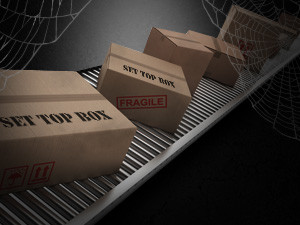
The Universal Service and Access Agency of SA (USAASA) has instructed manufacturers to suspend the production of digital terrestrial television (DTT) set-top boxes (STBs) until further notice.
The agency says its decision to suspend production follows the Supreme Court of Appeal's (SCA's) judgement in May, that the use of unencrypted STBs is "unlawful and invalid" and accordingly set aside. The appeal court found the amendment did not follow a process of consultation and was irrational and in breach of the principle of legality.
In a statement issued to ITWeb, USAASA says it has only suspended the production of DTT STBs, while direct to the home (DTH) decoders are not affected and the production thereof continues.
As the agency charged with the responsibility of managing the production and installation of STBs, USAASA has contracted manufacturers to produce both DTT and DTH decoders.
DTH STBs are encrypted as per the SABS standards and have been distributed to qualifying households in the border areas which will not receive DTT signals. Meanwhile, the DTT decoders are not encrypted as per the amendments to the Digital Migration Policy, according to USAASA.
"This called up on USAASA to analyse the implications of the SCA order and seek legal advice thereof," the agency says.
It continues: "On the strength of the advice received, USAASA decided to suspend production of the DTT set-top boxes as part of exercising the fiduciary duties of the board of director as per section 50 of the PFMA, until further directive from the executive authority. Please note this only applies to the DTT STBs, which were affected by the judgement.
The agency adds: "USAASA is then further analysing the implications of this legal process in relation to increasing risks, avoiding incurring irregular and wasteful expenditure and discussing mitigation actions."
Money matters
The Department of Communications (DOC) has not taken the SCA judgement lying down and will battle the ruling that favours encrypted decoders. The department confirmed it has approached the Constitutional Court (ConCourt) for an application to appeal.
It was also reported that pay-TV operator M-Net, a subsidiary of MultiChoice, has lodged its own appeal papers with the highest court in the land in favour of unencrypted STBs.
USAASA's decision to suspend the production process as well as the DOC and M-Net's leave to appeal application has further threatened to put a spanner in the country's switch from analogue to digital TV viewing.
USAASA will now await the ConCourt's decision on the technical specifications for government-subsidised STBs before it can continue with the production of DTT decoders.
SA missed the International Telecommunication Union's June 2015 deadline for all countries to migrate from analogue to digital television viewing.
"The minister of communications lodged a petition for a leave to appeal in response to the SCA judgement with a view to ask the Constitutional Court to look into the matter. The matter is therefore back before the court and therefore sub-judice," says USAASA in the statement.
Last year, the DOC placed the first order for 1.5 million STBs with USAASA. Government plans to subsidise five million poor TV-owning households.
According to USAASA, as of 31 May, 447 458 DTT STBs have been manufactured and verified, and 166 108 have been delivered to the South African Post Office's warehouses. As of 31 May, 20 306 DTH STBs were manufactured and verified, and 5 306 have been delivered to the post office.
The National Association of Manufacturers in Electronic Components (Namec) previously called the production of more than 400 000 STBs with no capabilities to encrypt broadcast signals a fruitless and wasteful expenditure.
Namec, which lobbied to make sure the bulk of the tender to produce subsidised STBs is awarded to local emerging electronic manufacturers, criticised the use of unencrypted STBs for digital migration.
According to Namec, encryption will not only boost the content industry, but critical skills and knowledge will be developed in the areas of software technology, encryption technology and programming.
Share